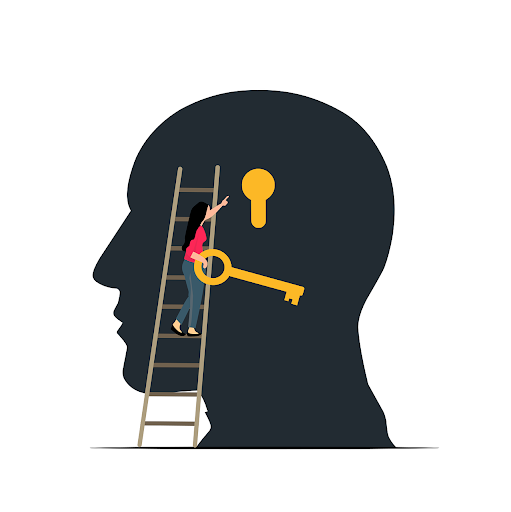Written & Edited By: Larissa Alphonso & Sadaf Iqbal

What is Neuroplasticity?
Neuroplasticity is our human superpower. "Neuroplasticity" refers to your brain's ability to restructure or rewire itself when recognizing the need for adaptation. In other words, it can continue developing and changing throughout life. For example, if brain trauma after a car accident affects your speaking ability, you haven't necessarily lost this ability permanently. Therapy and rehabilitation can help your brain relearn this ability by repairing or creating new pathways. Neuroplasticity also seems to have promise as a driver of potential treatment for certain mental health conditions. Experts believe that the negative thought patterns with depression, for instance, could result from interrupted or impaired neuroplasticity processes. Exercises that promote positive neuroplasticity may help "rewrite" these patterns to improve well-being.
Rewiring your brain with the right exercises:
If you don't consciously decide to end the cycle of pain and retrain your brain, the problems will not disappear. Limiting conditioning is most likely to acquire momentum from an early age. Now, these perceptions of reality have been fixated in your brain long enough so you believe they are the ultimate truth. There are ways to do it, and these require your conscious effort and commitment on your end. A commitment to a better future. Below, we've rounded up some of the top exercises to increase neuroplasticity for starters but remember, creativity is the king here:
1. Don't let the workday linger:
Like muscle-building, neuroplasticity needs downtime to do its work correctly. Managers should embed and enforce a "close the day" ritual that prioritizes reflection and gratitude for small wins. An end-of-day message saying, "Thanks for the great ideas in the brainstorming session today, everyone. See you tomorrow" can help the team feel valued. Putting a hard stop to the day's stresses in a way that also boosts endorphins creates perfect conditions for neuroplasticity. It also signals that it's OK to "leave" work and unplug for the evening.
2. Travel:
One of the best bits of science we've ever discovered is that going on holiday is good for your brain. Not only is it fun, essential for managing your nerves, and great for your personality, but it also increases neuroplasticity. The new places, people, food, language, and culture are all ways of pushing you out of your comfort zone. It means you learn by necessity, forcing the brain to problem-solve and adapt and your neurons to fire in new ways. For example, think about the last time you had to navigate to where you were staying in the middle of the night without being able to read or speak a word of the local language in the pouring rain while trying to hang on to your sense of humor.
3. Mindfulness Meditation:
Mindfulness meditation is an effective practice that has been shown to impact brain development significantly. You can reshape your brain's neural connections simply by focusing on the present moment and accepting it without judgment.
Here's how you can do mindful meditation:
Look for a quiet, comfortable place to sit or lie down.
Close your eyes and take a few deep breaths to center yourself.
Concentrate on your breathing, feeling the sensations of your movements as you inhale and exhale.
When your thoughts wander, gently bring them back to your breathing.
Practice this for a few minutes daily, gradually increasing the time.

4. Reduce Stress:
Stress is a silent enemy, and it also reduces brain plasticity. If you can't lower your life's stress causes, you can alter how you react to it. Relaxing yourself with nature or traveling is an excellent way to relax. Meditation is another way to control your reactions to stress. Brain lateralization, another method, is used to specialize the functioning of each brain hemisphere.
5. Get enough sleep and nutrition:
Adequate sleep may be the most essential ingredient for neuroplasticity. Sleeping helps to store new information, solidify new connections, form new memories, and clear the brain so that it can begin to absorb further information. Proper nutrition also plays a vital role in the health and plasticity of your brain. Be sure to get enough magnesium, choline, and omega 3's as well; these edible memory boosters are great for improving your brainpower.

Conclusion:
The brain has an amazing ability to change throughout our lives, allowing us to learn new things or recover after sustaining a brain-based injury. Still, there are limits to how much the brain can adapt. Constantly challenging ourselves, making sleep a priority, and getting regular exercise can also help improve brain plasticity. There are many ways to retrain the brain and influence the neural network. You need to find out which way resonates with you and stick to it. The key to success is to be persistent and follow your chosen method repeatedly until you notice you're breaking the negative patterns of your old self. If you have any questions or queries, you can contact experienced counselors and therapists or the team from Project C Foundation. We will be glad to assist you.
• Therapists/Counsellors from Project C Foundation:
— Apurva S. Bhardwaj
specialization: Anxiety, Depression, Grief, Relationships, Mindfulness, Stress
— Ananya Praveen
Specialization: Anxiety, Depression, Career Counselling, Grief, Relationships, Mindfulness, Stress
References:
.png)
Comentários